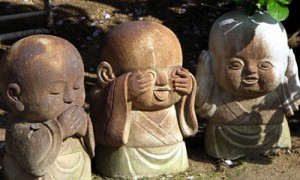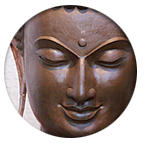
Morality is woven into the fabric of all Buddhist teachings; it is the foundation from which enlightenment becomes possible. Wisdom does not spring solely from the brain’s cleverness; it requires an open heart, filled with merit. Thus, by embracing, practicing and truly internalizing the morality teachings, we create the conditions that can lead to freedom from confusion and suffering, and, therefore, to understanding.
Loving Kindness
Loving kindness focuses on happiness and its causes; through it, we actively bathe others (and ourselves) in loving thoughts and feelings.
Particularly in the West, there is a sense that love—even parental love—is merit-based: We deserve to be loved because of the way we have acted or what we have achieved. But genuine loving kindness is unconditional. Everyone deserves to be loved, to be protected—and to be free from suffering.
Loving kindness is like a mirror; when we give it to others, we also benefit. When we smile at someone, they return the smile. When we project positive emotions, those emotions displace negative ones in our minds. When we create an aura of love for others, we ourselves feel love, too.
Loving kindness works in partnership with compassion.
Compassion
Compassion focuses on freeing others from unhappiness and the many root causes of unhappiness. Like loving kindness, it is a practice that requires viewing everyone as equally deserving; it cannot stem from pity or superiority. Rather, it springs from an understanding that every being is suffering in some way, and a desire to help ease or eliminate that suffering.
On a broader level, compassion also contributes to our own spiritual development. When we think of others’ needs, we focus less on ourselves, and in doing so, find release from our own suffering.
Compassion works in partnership with loving kindness.
 To see Rinpoche discuss the importance of compassion in daily life, please click here.
To see Rinpoche discuss the importance of compassion in daily life, please click here.Generosity
Generosity is intentionally giving of ourselves to help others. True generosity comes from within and is something that everyone can practice—even beggars. While material generosity is easily understood, generosity also encompasses the giving of time, skills, praise, advice or knowledge.
Of course, generosity needs to be practiced with proper guidance and true understanding. Why, what and to whom we give all make a difference. If we give simply as a favor or because we feel it will look bad if we don’t, that’s social giving; it’s not from our heart. If we give someone a weapon simply because they ask, it may be generous, but it also may cause great harm. If we give a bottle of water to someone who is not thirsty it doesn’t mean much, but if we give it to someone in the desert it means a great deal.
Ultimately, generosity is an approach to life that stems from loving kindness and compassion—tempered by common sense.
– Kalhil Gibran
Mental Purification
Mental purification is positive thinking. In reality, we don’t know if the glass is half full or half empty. But thinking positively is better for our lives and can minimize suffering.
- Appreciate what we have, rather than clinging to negative thoughts about what we don’t have.
- Know that when we look for imperfections we find lots of them; when we look positively, we still see imperfections, but they won’t seem as important.
- Realize that imperfection isn’t bad; it is simply part of how we live and what we are.
In short, focus on the positive aspects of friendship, health, relationships, money— everything.
 To see Rinpoche discuss the value of cultivating positive energy, click here.
To see Rinpoche discuss the value of cultivating positive energy, click here.Causality
For example, to grow an oak tree requires an acorn, fertile ground, sun, water, sufficient space and time. When these conditions align, a small acorn becomes an enormous tree; if even one element changes, the tree will be less robust—or perhaps never even grow.
This happens in human life, too. Who we are depends on what we do, what we think and what we believe. Each thought and action leaves an imprint on our minds. Over time these imprints change our character, effecting everything in our lives.
Devotion
Devotion is the basis of the relationship between student and teacher. Seeing the innate quality of the student, the teacher is open and has great kindness, compassion and respect. Similarly, the student has great respect for the teacher’s activated wisdom, to which the student must be completely open. Indeed, wisdom is the real teacher.

LIVE BETTER
Life is complex, puzzling and often painful.
Sometimes it seems there must be a better way
to manage—and there is. It is as simple as looking
at a problem through a different lens.



